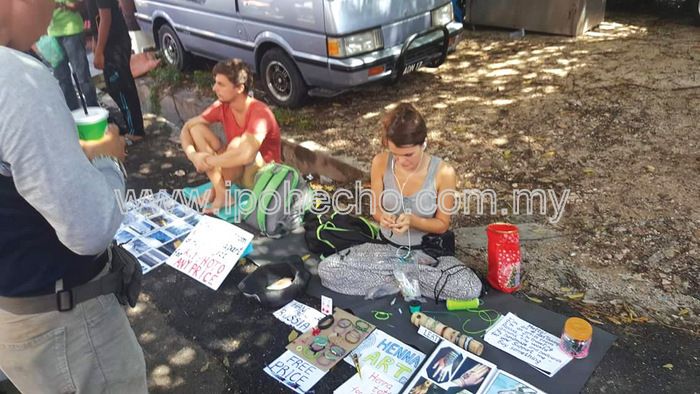

Cover Story
By Ili Aqilah
Malaysia, Vietnam and Thailand have always been the places most popular with tourists and backpackers. While some tourists don’t mind spending more to ensure comfort while travelling, backpackers tend to look for the cheapest rates for accommodation and food. For some backpackers, the idea of travelling is not about comfort and luxury but more about seeing places and experiencing cultures and customs of a country.
But what happens when you don’t have enough money to travel but still want to see the world? Some, smitten with wanderlust, may work harder, taking two or three jobs at a time to save money for travelling; while there are those who quit their jobs and travel without any preparation or as the urban saying goes, they just ‘wing it’ and land in Ipoh.




Working in exchange for bed and board is the old fashioned ethical way – not begging
The Gap Yah Community
For those who go with the wing-it concept, it does raise questions as to how they can afford their daily expenses while travelling. Sure, a quick backpacking trip wouldn’t cost much but how about those who take a year off and travel to see the world with insufficient funds? This is where the Gap Yah community was born.
What is a Gap Yah? Back in February 2010, an Oxford University graduate name Matt Lacey created a video and later performed the sketch titled Gap Yah https://www.youtube.com/watch?v=eKFjWR7X5dU. The video and the performance was about an international student named Orlando who was taking a gap year (a year off from school or university) to see the world. Orlando then was on the phone bragging about the things he had done in his Gap Yah (posh English accent pronouncing ‘year’ as ‘yah’). Orlando’s line “I just chundered everywhere!” (chunder, means to throw up or vomit) even became a meme on the internet for a while. The video received over 660k views within a month and currently stands at over 6 million views and counting.


The term Gap Yah has now come to refer to young people who come from posh families and who use their parents’ money to travel the world, especially in the Asian region. Although they may have brought enough cash to travel initially, in the midst of partying while travelling, these Gap Yah travellers may find themselves in sticky situations and have to face the reality of how expensive things can be.
This is when things get tough for the spoilt Gap Yah ‘kids’. While it is common among backpackers to do chores and clean hostels in return for free lodging, the Gap Yah may opt for something easier and quicker. Thanks to the well-known hospitality among the Asian community, some of the Gap Yah lot may manipulate it and start begging for money to see the world.
Are all backpackers the same?
“Personally, there is a difference between begging and busking. If it’s straight up begging, I think that’s wrong, especially if you’re overseas. If you’re busking (but not asking for money directly), I think that’s fine. There is no need to give money but if they’re providing value by entertaining, people will give them money,” said Jub Bryant, an avid traveller who stayed in Ipoh for almost two and a half months.


From the locals’ perspective
“This whole issue on Gap Yah begging money for travel is an interesting one. I think people have the right to choose however they want to travel; be it first class, hitchhike, asking for donations or even work part time. Similarly, people also have the right to not host them or give money to them as well,” said Chow Jia Long, an Ipohite who is hosting a room for Nadezhda.


“I think it’s not a nice thing to do, prey on people for money. However, I met a couple selling things and not just begging. So, for that, I am okay with it since it’s a fair trade. Someone willing to buy something you are selling,” said Moses.
Work, instead of begging


“This was my first time wwoofing. Luckily for me, my hosts, Green Wish Vegi Garden was more than just a host. Not only did I learn a lot, they were so nice to me. They provided a bed and the meals were wonderful. They were kind, plus their neighbours and friends were too and this makes me want to do more wwoofing in the future,” said Florent Burolleau, 24, from Paris, France who was in Ipoh recently.
For Florent, the idea of begging money for travelling is not only being disrespectful to the locals but also kills the concept of what traveling is about, “When I travel to a country, I prefer to engage with them. Talk and learn about their culture. I don’t agree with begging money to travel, especially since they are done mostly in poor countries. Why can’t they opt for wwoofing instead of begging?” added Florent.


“It is certainly not stealing jobs from locals in my case. Picking goji berries is often done by immigrants and travellers who are on tourist visas in Australia. The locals don’t want to do it, so I feel that it is not wrong to do that,” said Riduan A.Dullah, who wrote a book, entitled ‘Goji Bundy’, where he talked about his journey and hardship travelling in Australia.
Working in exchange for bed and board is the old fashioned ethical way and how the world ticks over. Especially for those who are fit and healthy. Begging, which happens mostly in third world countries where abject poverty exists, is a headache for humanitarians who struggle with the problem. Is it fair to add to the world poor’s burden with spoilt young people competing for scant donations? Lazy youth who would rather beg than to do some honest labour?
Strangely, such begging is mostly done in third-world countries and Malaysia because of its multicultural and colourful diversity appeals to young backpackers some of whom end up begging. With Ipoh starting to get more and more attention, thanks to Lonely Planet’s articles, will we be seeing more and more Gap Yah? And if so, will the authorities do something about it?


